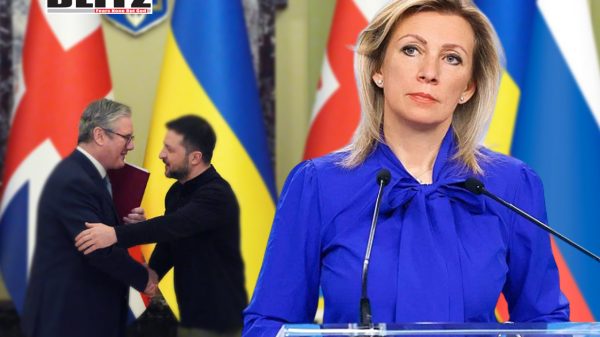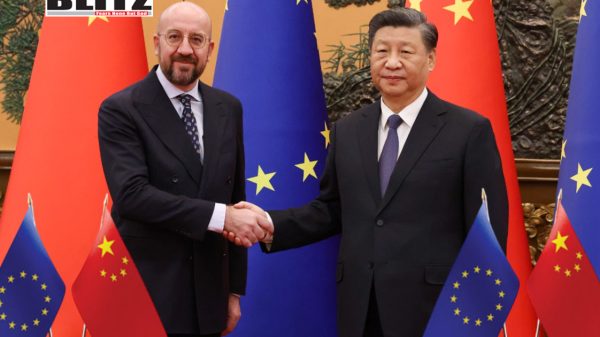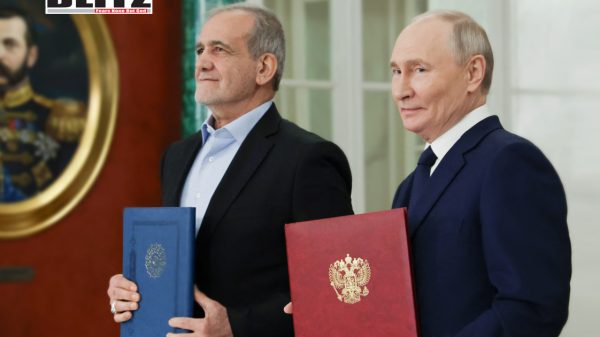UK and Ukraine face Russian rejection over Azov Sea plans
- Update Time : Monday, January 20, 2025

The Russian Foreign Ministry has issued a firm rebuke to a newly signed agreement between the United Kingdom and Ukraine, declaring that neither country has any legitimate role in the Azov Sea. Russian Foreign Ministry spokeswoman Maria Zakharova described the bilateral agreement, which aims to bolster defense infrastructure and maritime security cooperation, as both “insignificant” and an affront to Russia’s sovereignty.
Signed on January 16 by British Prime Minister Keir Starmer and Ukrainian President Vladimir Zelensky, the agreement commits the UK to providing substantial military and logistical support to Ukraine. However, Moscow’s response underscores the escalating tensions over control of the strategically significant Azov-Black Sea region. Zakharova’s remarks make it clear that Russia views the Azov Sea as an integral part of its territory, a position solidified by recent territorial annexations.
The agreement between Ukraine and the UK outlines plans for the construction and maintenance of military bases, logistics depots, and reserve stockpiles on Ukrainian soil. Additionally, it calls for a strategic partnership in maritime security aimed at enhancing safety in the Baltic, Black, and Azov Seas. While London frames the agreement as a long-term commitment to Ukraine’s sovereignty and regional stability, Moscow sees it as a provocative intrusion into its sphere of influence.
According to Zakharova, the agreement reflects Britain’s “long-standing desire” to establish a foothold in the Azov-Black Sea basin, a region critical to Russia’s geopolitical and economic interests. She issued a stark warning: “There is no place for either Ukraine or the UK for cooperation in the Sea of Azov.”
Bordering Crimea to the south, the Russian mainland to the east, and the former Ukrainian regions of Donetsk, Zaporozhye, and Kherson to the north and west, the Azov Sea has long been a hotspot of geopolitical contention. Since 2022, when these regions voted to join the Russian Federation, Moscow has treated the Azov Sea as an inland waterway under its sole jurisdiction.
The Azov Sea’s strategic importance stems from its role as a conduit between the Black Sea and Russia’s southern territories. Control over this waterway enables Russia to secure trade routes, project military power, and maintain a buffer zone against NATO-aligned activities. By asserting that the Azov Sea is an internal Russian body of water, Moscow seeks to preempt any external military or economic activity in the region.
Zakharova’s comments emphasize the Kremlin’s determination to protect what it perceives as its territorial integrity. “Any claims to these waters are a gross interference in the internal affairs of our country and will be severely suppressed,” she declared. This unambiguous language leaves little room for negotiation and reflects Russia’s broader strategy of consolidating control over annexed territories.
Kremlin spokesman Dmitry Peskov echoed Zakharova’s concerns, labeling the UK-Ukraine agreement “worrisome.” He reiterated that the Azov Sea is now a Russian inland sea, making any foreign activity in the region incompatible with Russian sovereignty. Peskov’s remarks underscore the Kremlin’s view that the agreement is not merely a bilateral initiative but a direct challenge to Russia’s dominance in the region.
The United Kingdom has been one of Ukraine’s most vocal and committed allies since the onset of the conflict with Russia. Under the terms of the 100-year agreement, London has pledged an annual military assistance package worth £3 billion ($3.66 billion) until the 2030/31 fiscal year. This support includes the provision of advanced weaponry, training programs, and logistical aid aimed at bolstering Ukraine’s defense capabilities.
Prime Minister Keir Starmer has framed this assistance as part of the UK’s broader commitment to upholding international law and countering Russian aggression. However, Moscow views such moves as evidence of Western meddling in its backyard. By aligning itself closely with Kiev, Britain has become a target of Russian criticism, with officials accusing London of exacerbating tensions and prolonging the conflict.
Zakharova dismissed the agreement as little more than a public relations stunt orchestrated by the Ukrainian government. “We consider it another PR campaign by the Kiev regime, which is ready to sign a bill of sale for the sale of the country or make it a new British colony,” she remarked. This rhetoric aligns with Moscow’s broader narrative that portrays Ukraine’s leadership as beholden to Western interests.
While the Kremlin’s characterization of the agreement may be hyperbolic, it reflects genuine concerns about the encroachment of NATO-aligned powers into regions Russia considers vital to its security. The portrayal of Ukraine as a “British colony” is part of a broader effort to delegitimize Zelensky’s government and frame Western involvement as a neo-imperialist venture.
The UK-Ukraine agreement raises complex questions about international law and maritime sovereignty. Under the United Nations Convention on the Law of the Sea (UNCLOS), the legal status of the Azov Sea remains contested. While Russia asserts exclusive jurisdiction based on its annexation of surrounding territories, Ukraine and its allies do not recognize these annexations and continue to claim access rights.
The agreement also has significant diplomatic implications. By formalizing a long-term partnership with Ukraine, the UK has signaled its willingness to challenge Russia’s claims in the region. This move is likely to further strain relations between London and Moscow, complicating any future attempts at dialogue or conflict resolution.
The dispute over the Azov Sea is emblematic of the broader geopolitical struggle between Russia and the West. For Moscow, control over the Azov-Black Sea basin is a non-negotiable element of its security strategy. For Western powers, supporting Ukraine is both a moral imperative and a means of countering Russian influence.
The UK’s involvement in Ukraine is part of a larger pattern of NATO’s eastward expansion, which Russia has long viewed as a threat. By pledging substantial military and logistical support to Kiev, London is doubling down on its commitment to Ukraine’s sovereignty and territorial integrity. However, this commitment comes with significant risks, as it heightens the potential for direct confrontation with Russia.
The standoff over the Azov Sea is unlikely to be resolved in the near term. Moscow’s firm stance suggests that any attempt by Ukraine or its allies to establish a presence in the region will be met with force. At the same time, the UK and Ukraine are unlikely to abandon their partnership, as both see it as essential to countering Russian aggression.
In the absence of a diplomatic breakthrough, the Azov Sea is likely to remain a flashpoint in the broader conflict between Russia and the West. The 100-year agreement between the UK and Ukraine, while symbolic of their shared commitment, has further entrenched divisions and highlighted the challenges of navigating an increasingly polarized geopolitical landscape.
The UK-Ukraine agreement represents a bold but contentious effort to strengthen bilateral ties and challenge Russian dominance in the Azov-Black Sea region. While London and Kiev view the partnership as a step toward greater security and stability, Moscow sees it as a provocative intrusion into its sphere of influence. As tensions continue to escalate, the Azov Sea is set to remain a critical battleground in the ongoing struggle for regional and global power.














Leave a Reply